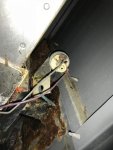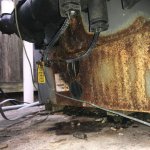Well, a tech came out and saw the unit, pointed out the melted sensor wires you see in the pix and a rusted hole in the adjacent sheet metal. He then pronounced it dead and recommended a pentair 40OK MasterTemp.
I later repaired the wire harness, and there is indeed some hot air blowing out of the side of the box under the polymer header which can't be good, but I don't yet have a specific diagnosis.
In discussion of replacement units, the tech seemed surprised there was a pentair HD unit with cupronickel exchanger, and I didn't get the idea he was knowledgeable of the pros and cons of copper-nickel. When asked about the Raypak 400k he said it was a good simple design but bulky and susceptible to rust in a salt water pool. He says all his salt water pools show rust.
He also did not seem to be too aware of what a a sacrificial anode is - I am considering one since I have some suction grill corrosion and broken screws in my spa.
----- Hey, Dave. Is there a question here somewhere?
1) What are points of failure of Raypak, and will cupronickel-nickel or commercial version support these failure points (for example
raypak [h=1]
C-R407A-EN-X 010230 tubing is 50% thicker)[/h]2) I hate being an internet prick questioning the experienced pro but should I look to another installer because this guy doesn't speak the lingo?
3) Should I consider some zinc to protect the limited other metals I have in my pool (copper tubes, light facades, etc)
Thx,
David - Dallas





